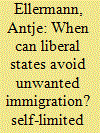|
|
|
Sort Order |
|
|
|
Items / Page
|
|
|
|
|
|
|
| Srl | Item |
| 1 |
ID:
081368


|
|
|
|
|
| Publication |
2008.
|
| Summary/Abstract |
Despite the recent proliferation of policy initiatives designed to curb illegal immigration, advanced industrialized states have made little headway towards the goal of effective migration control. Examining the case of deportation in Germany and the European Union, this article contends that one of the most fundamental reasons underlying this failure is a unilateral policy bias that fails to take into account two related conditions. First, policies of migration control directly and substantially impinge upon the interests of foreign governments. Secondly, the cooperation of foreign officials is an essential condition for policy implementation. To the extent that they disregard these basic conditions, then, migration control policies are bound to fail. By examining the implementation of deportation policy, the article illustrates the limited efficacy of control measures that are dominated by the interests of advanced industrialized states to the exclusion of the concerns of foreign governments
|
|
|
|
|
|
|
|
|
|
|
|
|
|
|
|
| 2 |
ID:
100279


|
|
|
|
|
| Publication |
2010.
|
| Summary/Abstract |
This article explores the possibility of resistance under conditions of extreme state power in liberal democracies. It examines the strategies of migrants without legal status who, when threatened with one of the most awesome powers of the liberal state-expulsion-shed their legal identity in order to escape the state's reach. Remarkably, in doing so, they often succeed in preventing the state from exercising its sovereign powers. The article argues that liberal states are uniquely constrained in their dealing with undocumented migrants. Not only are they forced to operate within the constraints of the international legal order-making repatriation contingent on the possession of identity documents-but the liberal state is also constitutionally limited in its exercise of coercion against the individual. The article concludes that it is those individuals who have the weakest claims against the liberal state that are most able to constrain its exercise of sovereignty.
|
|
|
|
|
|
|
|
|
|
|
|
|
|
|
|
| 3 |
ID:
121909


|
|
|
|
|
| Publication |
2013.
|
| Summary/Abstract |
Advanced democracies, it is commonly argued, are unable to prevent unwanted immigration because their sovereignty is "self-limited" by virtue of their normative, legal, and economic liberalism. This article challenges this claim by examining a critical test case that is at the heart of self-limited sovereignty arguments: guest worker recruitment in postwar Switzerland and West Germany. The author shows that, contrary to conventional wisdom, the unintended settlement of guest workers was not a universal given but instead was far less extensive in Switzerland than in West Germany. This difference in exposure to unwanted immigration, she argues, was the result of path-dependent processes that can be traced back to the inception of each country's recruitment program. Whereas West German officials made no concerted effort to control settlement until the program's termination, Swiss policy from its beginning was marked by state-enforced worker rotation and the prevention of family unification. To account for these critical differences in policy design, the article argues that each guest worker system was fundamentally shaped by two sets of factors. First, program design varied depending on whether or not political elites could draw policy lessons from past experience with temporary worker programs. Where past recruitment had resulted in unwanted settlement, as had been the case in Switzerland, political elites sought to adopt policy provisions designed to prevent the past from repeating itself. Where past policy failure was absent, as was the case in West Germany, policymakers were less concerned with preempting settlement. Second, recruitment policy reflected the degree to which policymakers were able to operate autonomously from cross-cutting interests. Whereas the West German government could pursue recruitment relatively insulated from both business and popular pressure, Swiss policymakers had to repeatedly accommodate both sets of actors, in the process devising a recruitment system firmly premised on the principle of worker rotation.
|
|
|
|
|
|
|
|
|
|
|
|
|
|
|
|
|
|
|
|
|